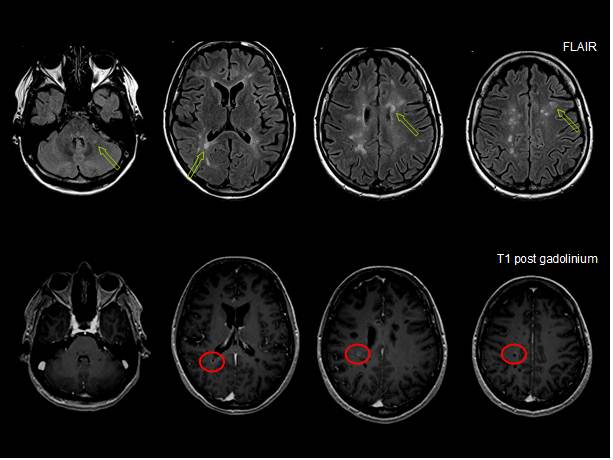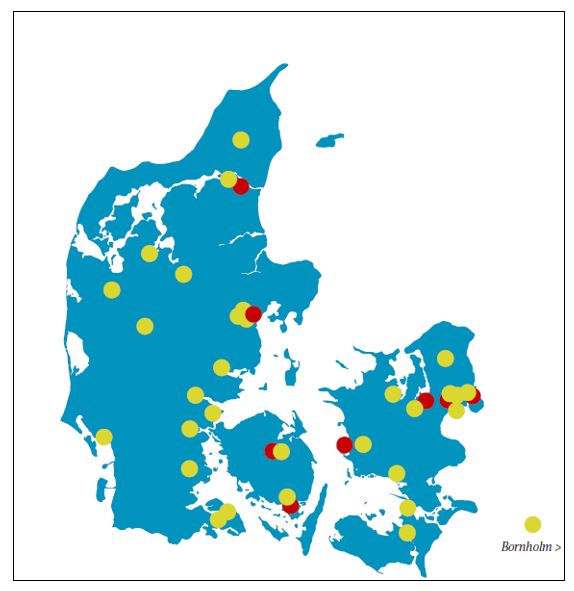by Michael Khalil 
Multiple Sclerosis (MS) is a main area of interest for Austria’s neurologic community. One reason for this is the rather high prevalence of this disorder which in 2002 has been estimated to be around 100 per 100,000 people, i.e. quite similar to the prevalence found in other Central European countries (Baumhackl et al., 2002). More recent estimates assume that there are even as much as 12.500 individuals that suffer from MS in our country with a population of about 8.4 million inhabitants. Furthermore the means to influence the course of this often disabling disorder have increased tremendously over the past years starting with the introduction of interferon-ß now twenty years ago. Along these lines Austria’s neurologists have attempted to be at the forefront both in the treatment of MS and regarding scientific contributions to the understanding of this disorder.
MS treatment and care in Austria is based on specialised MS centres across the country which are located mostly in Departments of Neurology but can also be run by practising physicians with expertise in MS. As these MS centres are regionally well distributed they allow easy access to specialised MS care for all patients.
The Austrian Society of Neurology (OEGN) (www.oegn.at) has defined criteria, which need to be fulfilled to obtain the status of “MS centre”. Besides expertise of the responsible neurologist in MS management, each centre is required to work within defined networks so that all aspects of clinical MS management are covered, including magnetic resonance imaging (MRI), cerebrospinal fluid (CSF) work up, MS specialised neurologic rehabilitation, neuropsychology, social provision, etc. Furthermore, a standardised documentation within patient’s records is mandatory. Another important aspect includes the requirement for constant professional training and exchange of knowledge in the context of so called MS User-Meetings, other educational courses and specialised neurological conferences. Since the approval of Natalizumab and Fingolimod the OEGN has also installed a MS registry to record all patients treated with these drugs. This was implemented to help in the detection of more rare and unknown side effects and to monitor the efficacy of these drugs in clinical practice.
All these efforts ensure optimal clinical management of MS patients across the country with high quality standards, uniform treatment perception and continuous information exchange.
Austria also has a long history of intensive research activities in the field of MS. The three public universities located in Vienna, Innsbruck and Graz focus on different aspects of MS research. Thus collaboration among these centres is an ideal way to generate synergies and there are several examples of successful common studies in the past which have also involved the network of Austrian MS centres whenever possible.
While the Department of Neuroimmunology, Center of Brain Research at the Medical University of Vienna, headed by Prof. Dr. Hans Lassmann focuses strongly on basic research and histopathology regarding immune mediated mechanisms of MS, the Department of Neurology at the Medical University of Vienna, headed by Prof. Dr. Eduard Auff focuses on applied MS research. In this context the enormous loss for the Austrian MS community by the unexpected death of Prof. Dr. Karl Vass in autumn 2012 and working at this Department deserves mentioning. The Department of Neurology at the Medical University of Graz headed by Prof. Dr. Franz Fazekas is renowned mainly for its contributions in neuroimaging. More recently the implementation of a biobank, including CSF, blood and DNA samples also serve to add this information to the clinical and morphological data. The Neuroimmunological Research Unit at Innsbruck Medical University – Prof. Dr. Thomas Berger, Prof. Dr. Florian Deisenhammer, and Prof. Dr. Markus Reindl – focuses primarily on neurological laboratory tests in body fluids for MS and related disorders such as neuromyelitis optica.
MS research centres in Austria are furthermore actively involved in international collaborative organisations, such as MAGNetic Resonance In Multiple Sclerosis (MAGNIMS) (www.magnims.eu) and the European BioMS Society (www.bioms.eu).
Altogether the Austrian system of established MS centres across the country with high quality standards allows optimal MS patient care and management. Strong efforts in the field of basic and applied MS research may help to further understand the disease and develop optimised treatment strategies on an individual basis.

References:
Baumhackl U, Eibl G, Ganzinger U, Hartung HP, Mamoli B, Pfeiffer KP, Fazekas F, et al. (2002). Prevalence of multiple sclerosis in Austria. Results of a nationwide survey. Neuroepidemiology, 21(5), 226–34.
Dr. Michael Khalil works at the Department of Neurology at the Medical University in Graz, Austria.






